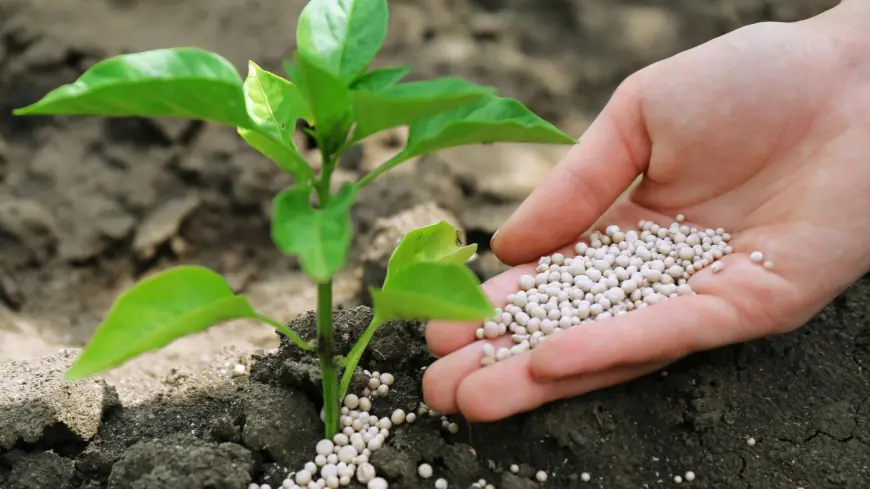Thailand Fertilizer Market to Surpass US$ 1.73 Billion by 2033, Driven by Growing Food Demand and Sustainable Farming Practices
According to the latest research from Renub Research, the Thailand Fertilizer Market is projected to grow from US$ 1,071.08 million in 2024 to US$ 1,732.51 million by 2033, at a CAGR of 5.50% between 2025 and 2033.

Government Support, Smart Agriculture, and Farmer Awareness Fuel Growth in Thailand’s Fertilizer Industry
According to the latest research from Renub Research, the Thailand Fertilizer Market is projected to grow from US$ 1,071.08 million in 2024 to US$ 1,732.51 million by 2033, at a CAGR of 5.50% between 2025 and 2033. This growth reflects Thailand's strategic push toward agricultural self-sufficiency, enhanced crop yields, and environmentally responsible fertilization.
? Access the Full Report on Thailand Fertilizer Market
Fertilizers at the Heart of Thailand’s Agricultural Strategy
Feeding a Growing Population with Limited Arable Land
As Thailand’s population grows and its role as a key agricultural exporter strengthens, the need for higher crop yields has never been greater. Fertilizers play a crucial role in ensuring food security, especially for rice, rubber, sugarcane, palm oil, and cassava—Thailand’s most critical crops.
To meet domestic and export demands, Thai farmers are increasingly turning to both organic and synthetic fertilizers to boost productivity, enhance soil fertility, and combat nutrient depletion caused by decades of monoculture farming.
Key Growth Drivers in the Thailand Fertilizer Market
Government Subsidies and Strategic Agricultural Policies
Thailand's government provides fertilizer subsidies, especially to smallholder farmers, to promote balanced fertilization and soil management. Through initiatives such as:
-
Smart Farmer Program
-
Soil Doctor Network
-
National Agricultural Extension Programs
...the government is encouraging the responsible use of fertilizers and the adoption of modern farming techniques, which in turn stimulates fertilizer demand.
Export-Oriented Crop Production
As one of the world’s top exporters of rice, cassava, rubber, and tropical fruits, Thailand relies on fertilizers to maintain the quality and quantity of agricultural output. Fertilizer use is particularly vital in meeting export standards related to crop size, quality, and consistency.
Rising Awareness About Soil Health and Precision Agriculture
Knowledge-Driven Fertilizer Application
Farmers in Thailand are becoming more educated about the importance of balanced fertilizer application. There is a growing shift from overuse of nitrogen-heavy formulas to a more targeted approach using NPK blends, micronutrients, and organic compost.
Through digital platforms and agricultural extension services, Thai farmers are learning to analyze soil conditions and apply fertilizers more efficiently, increasing both crop yield and environmental sustainability.
Adoption of Smart Farming Techniques
With Thailand’s gradual adoption of precision agriculture, technologies like GPS soil mapping, sensor-based irrigation, and AI-driven crop monitoring are also influencing fertilizer application. This digital transformation is creating demand for specialty and customized fertilizers that work in tandem with technology for better ROI.
Market Segmentation: Fertilizer Types and Crop Applications
By Fertilizer Type: NPK, Organic, and Specialty Fertilizers in Demand
The Thailand fertilizer market includes:
-
Nitrogenous Fertilizers (Urea, Ammonium Nitrate)
-
Phosphate Fertilizers (DAP, SSP)
-
Potash Fertilizers (MOP, SOP)
-
NPK Compound Fertilizers
-
Organic Fertilizers (Manure, Compost)
-
Specialty Fertilizers (Controlled Release, Micronutrients, Liquid Fertilizers)
Among these, NPK fertilizers remain the most popular due to their balanced nutrient supply. However, organic and specialty fertilizers are rapidly gaining market share thanks to their sustainable appeal and compatibility with modern farming techniques.
By Application: Rice and Horticultural Crops Drive Demand
Fertilizer application by crop includes:
-
Cereal Crops (especially Rice and Maize)
-
Fruits and Vegetables (Durian, Pineapple, Mango, Banana)
-
Cash Crops (Rubber, Sugarcane, Oil Palm, Cassava)
-
Horticulture and Floriculture
Rice, being the staple crop of Thailand, accounts for the largest share of fertilizer usage, followed by cassava, sugarcane, and rubber.
Regional Insights: Fertilizer Demand Across Thai Provinces
Central and Northeastern Thailand Lead in Usage
Provinces such as Nakhon Ratchasima, Ubon Ratchathani, Khon Kaen, and Suphan Buri are major agricultural zones where fertilizer use is especially concentrated. These regions host extensive rice paddies, cassava fields, and sugarcane plantations, and benefit heavily from both government support and private sector investments in agro-inputs.
Southern Thailand Focuses on Rubber and Oil Palm
In the south, rubber and palm oil plantations are driving demand for potassium-rich and organic fertilizers, as these crops require specific nutrients to thrive under the tropical climate.
Import Dependency and Supply Chain Trends
Thailand Relies on Imports for Raw Materials
Despite being a major user of fertilizers, Thailand depends heavily on imports for raw materials like potash, phosphate rock, and ammonia, mainly from countries such as Canada, Russia, China, and the Middle East. This makes the market sensitive to global commodity prices, supply chain disruptions, and geopolitical issues.
However, domestic blending and manufacturing capabilities are growing, and the country is witnessing a rise in local fertilizer brands that tailor formulations to Thai soil conditions and crop types.
Competitive Landscape: Key Players and Strategies
The Thailand fertilizer market is moderately fragmented, with both multinational corporations and local players competing for market share.
Key Companies Include:
-
Yara International
-
Thai Central Chemical Public Company Ltd (TCCC)
-
ICL Group
-
The Mosaic Company
-
Haifa Chemicals
-
Olam International
-
Univanich Fertilizer
-
Petronas Fertilizer
-
Ajinomoto Fertilizer Thailand Co., Ltd
These players are focusing on:
-
Customized NPK blends
-
Eco-friendly organic fertilizers
-
Technological partnerships with agri-tech startups
-
Farmer education campaigns
Future Outlook: Toward Sustainable and Smart Fertilization
As Thailand works toward achieving its agricultural sustainability goals under Vision 2030, the fertilizer sector will see major shifts:
-
Increased use of biofertilizers and organic inputs
-
Greater adoption of digital agriculture for precision fertilizer use
-
Public-private partnerships to support fertilizer R&D
-
Growth in exports of Thai-blended specialty fertilizers to ASEAN nations
The integration of technology, sustainability, and education will define the next chapter of growth in Thailand's fertilizer market.
? To explore complete data, trends, forecasts, and competitive analysis, visit:
Thailand Fertilizer Market – Renub Research
New Publish Report:
- UAE Quick Service Restaurant (QSR) Market Forecast 2025-2033
- Saudi Arabia Quick Service Restaurant (QSR) Market: Trends, Growth Drivers, and Forecast 2025–2033
- United Arab Emirates Quick Service Restaurant (QSR) Market Size, Share & Forecast 2024–2033
About the Company
Renub Research is a Market Research and Consulting Company with more than 15 years of experience, especially in international Business-to-Business Research, Surveys, and Consulting. We provide a wide range of business research solutions that help companies make better business decisions. We partner with clients across all sectors and regions to identify their highest-value opportunities, address their most critical challenges, and transform their businesses.
Our wide clientele includes key players in Healthcare, Travel & Tourism, Food & Beverages, Power & Energy, Information Technology, Telecom & Internet, Chemicals, Logistics & Automotive, Consumer Goods & Retail, Building & Construction, and Agriculture. Our core team comprises experienced professionals with graduate, postgraduate, and Ph.D. qualifications in Finance, Marketing, Human Resources, Bio-Technology, Medicine, Information Technology, Environmental Science, and more.
Media Contact
Company Name: Renub Research
Contact Person: Rajat Gupta, Marketing Manager
Phone No: +91-120-421-9822 (IND) | +1-478-202-3244 (USA)
Email: [email protected]
What's Your Reaction?
 Like
0
Like
0
 Dislike
0
Dislike
0
 Love
0
Love
0
 Funny
0
Funny
0
 Angry
0
Angry
0
 Sad
0
Sad
0
 Wow
0
Wow
0

















































